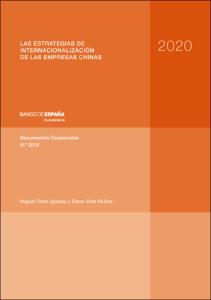Registro completo de metadatos
| Campo DC | Valor |
|---|---|
| dc.contributor.author | Otero-Iglesias, Miguel |
| dc.contributor.author | Vidal, Elena |
| dc.coverage.spatial | China |
| dc.date.accessioned | 2020-01-16T12:33:12Z |
| dc.date.available | 2020-01-16T12:33:12Z |
| dc.date.issued | 2020-06-03 |
| dc.identifier.issn | ISSN: 1696-2230 (en línea) |
| dc.identifier.uri | https://repositorio.bde.es/handle/123456789/10460 |
| dc.description.abstract | El objetivo de este trabajo es analizar las diferentes estrategias de internacionalización empleadas por China desde el inicio de su proceso de liberalización económica hasta la actualidad, en un contexto en el que su modelo de crecimiento se encuentra inmerso en un proceso de reequilibrio. Resulta evidente que la relación de China con el exterior podría estar cambiando. Por un lado, el país parece reestructurar su perfil exportador hacia uno más sofisticado, dirigido a la innovación, y menos dependiente del input exterior. Por otro, la importante y creciente salida de las multinacionales chinas obedece a la voluntad del Gobierno chino de invertir en aquellos sectores en los que este país se encuentra en desventaja competitiva (materias primas, bienes de consumo, tecnología). Ambas estrategias buscan cumplir un objetivo de desarrollo interno. |
| dc.description.abstract | The aim of this paper is to analyze the variety of internationalization strategies used by Chinese firms since the onset of its process of economic liberalization until now, in a context in which China is adjusting its growth model to a new equilibrium. It is evident that the relationship between China and the rest of the world could be changing. On the one hand, the country seems to be restructuring its export profile towards a more sophisticated one, directed to innovation, and less dependent on external input. On the other hand, the important and growing exit of the Chinese multinationals is due to the will of the Chinese government to invest in those sectors in which this country is at a competitive disadvantage (raw materials, consumer goods, technology). Both strategies seek to meet a domestic development objective. |
| dc.format.extent | 40 p. |
| dc.language.iso | es |
| dc.publisher | Banco de España |
| dc.relation.ispartof | Documentos Ocasionales / Banco de España, 2015 |
| dc.rights | Reconocimiento-NoComercial-CompartirIgual 4.0 Internacional (CC BY-NC-SA 4.0) |
| dc.rights | In Copyright - Non Commercial Use Permitted |
| dc.rights.uri | https://creativecommons.org/licenses/by-nc-sa/4.0/deed.es_ES |
| dc.rights.uri | http://rightsstatements.org/vocab/InC-NC/1.0/ |
| dc.subject | Internacionalización |
| dc.subject | Comercio |
| dc.subject | Reequilibrio |
| dc.subject | Inversión |
| dc.subject | Multinacionales |
| dc.subject | Internationalisation |
| dc.subject | Trade |
| dc.subject | Rebalancing |
| dc.subject | Investment |
| dc.subject | Multinationals |
| dc.title | Las estrategias de internacionalización de las empresas chinas |
| dc.type | Documento de trabajo |
| dc.identifier.bdebib | 000469002 |
| dc.identifier.bdepub | DOCA-202015-spa |
| dc.subject.bde | Comercio internacional |
| dc.subject.bde | Estructura y funcionamiento de la empresa |
| dc.subject.bde | Política industrial |
| dc.publisher.bde | Madrid : Banco de España, 2020 |
| dc.subject.jel | F15 |
| dc.subject.jel | F21 |
| dc.subject.jel | F23 |












